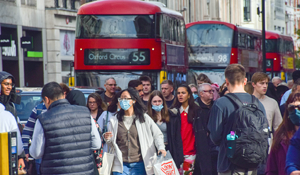Dr Debbie Weekes-Bernard is London’s Deputy Mayor for Communities and Social Justice. Since taking office in November 2018, Debbie has made it her priority to ensure London’s diverse communities have a voice in their city. She works to promote social justice and equality for all communities and is a key player in driving London’s social recovery from COVID-19, also chairing the Mayor’s Equality, Diversity and Inclusion Advisory group.

“The Mayor’s trailblazing menopause policy, which we announced on International Women’s Day, is leading the way in busting taboos and recognising the long term effects of the menopause.”
A Londoner born and bred
I am a born and bred Londoner, with a PhD in Psychology and Sociology. I am London’s Deputy Mayor for Communities and Social Justice.
Since taking office, I have made it a priority to ensure London’s diverse communities have a voice in their city. I work with the mayor to promote social justice and equality for all communities, and I play a key role in driving London’s social recovery from COVID-19.
I chair the Mayor’s Equality, Diversity and Inclusion Advisory group, as well as London’s Strategic Migration Partnership and am co-chair of the Diversity in the Public Realm Commission. I am also a member of the TUC Anti-Racism Taskforce and am Chair of Trustees for Praxis, a charity that supports migrants in London.
I joined the mayoral team in 2018 from the Joseph Rowntree Foundation where I led the organisation’s work on poverty and ethnicity with additional areas of expertise on labour markets, education, lone parents and young people. Prior to this, I worked at the Runnymede Trust as head of research, running their work on inclusive curriculum development, education attainment gaps and school exclusion as well as work on community cohesion, race and criminal justice and youth transitions.
I have also worked as a lecturer of social psychology and criminology, teaching students in both the further and higher education sectors.
I have sat on several influential panels and working parties including the Poverty Commissions for both the National Union of Students and the London borough of Lewisham, and am a member of the British Journal of Sociology of Education Editorial Board. I have also served locally as a chair of governors for two federated primary schools in East London.
Disproportionate impact of COVID on certain communities

It has had an enormous impact, particularly given the way it disproportionately affected certain communities in the city. Every Londoner has been affected by the pandemic but older and disabled Londoners, our Black and Asian communities and those living on lower incomes have been impacted disproportionately.
Lockdowns had a huge impact on women who, if they were parents, took on the lion’s share of home learning for children, or generally in the early stages of the pandemic were those most likely to lose their jobs.
Many people experienced lockdowns in overcrowded housing, experienced increased social isolation affecting their mental health, or had difficulties accessing education and health and care services due to digital exclusion.
The work that I do involves ensuring we do all we can to support those who experience inequality, be that unequal access to services or lack of representation in work, so during the pandemic I worked very closely with lots of partners, in the voluntary, community and faith sector, with funders and with local authorities to provide a coordinated, joined-up response for Londoners in need.
In December, we launched a new £1 million Community Grants Fund – which will enable grassroots community organisations and charities to enhance their work – and this is making a real difference to the lives of many in the capital. We want to ensure that all Londoners have the chance to thrive as the city rebuilds.
This fund builds on the work of the London Community Response Fund – a ground-breaking collaboration of over 67 funders – which awarded grants totalling more than £57 million in 2020/21 to support essential community action when the COVID-19 crisis first hit, such as supplying emergency food packages, adapting advice services and ensuring that rough sleepers were kept safe.
Impact on the gender pay gap across the GLA Group

The majority of the organisations have made progress in the last six years since Sadiq became Mayor, with a gender pay gap lower than both the London average of 16.2% and the national average of 15.4%, but we know there is much more work to do.
(You can see our gender pay gap data in the appendix at the end of this article.)
Initiatives in place to eradicate the gender pay gap
Sadiq introduced gender pay gap reporting earlier than required and was one of the first in the country to introduce ethnicity pay gap reporting. He is now leading the way by publishing disability pay gap data.
The majority of the organisations across the GLA Group have taken their own steps to address the pay gap. These plans are published on their websites.
This includes TfL working with colleagues, Staff Network Groups, trade unions and other stakeholders to develop a new Action on Inclusion strategy as well as producing a new four-year Pay Gap Action Plan, which will set out plans to reduce gender and ethnicity pay gaps.
Other organisations are doing a number of actions such as increasing the diversity of interview panels during the recruitment process, working with City Hall’s Race Equity Staff Network to understand the needs, concerns and experiences of the organisation’s employees, and signing up to – which contains seven measures to tackle inequality in the workplace.
Challenges (and opportunities) of working across a group structure
Working within a large organisation comes with many challenges, but also presents many opportunities. The GLA employs people with a broad range of skills and experiences – this means we are well-placed to facilitate the exchange of ideas and advance learning. Our recently announced menopause policy is a great example of collaborative working across a number of different groups and departments within the GLA.
Busting taboos around the menopause

The Mayor’s trailblazing menopause policy, which we announced on International Women’s Day, is leading the way in busting taboos and recognising the long term effects of the menopause. All staff at City Hall who are experiencing menopause and associated symptoms are entitled to request suitable support and workplace adjustments.
This could mean ensuring that the working environment is comfortable wherever possible, for instance with temperature-controlled areas, as well as flexible adjustments to the working day to accommodate the need to take breaks if symptoms become severe, time off to attend medical appointments, or suitable changes to work tasks when experiencing symptoms. This will ensure that anyone experiencing menopausal symptoms gets the same support and understanding as if they had any other health issue.
This new approach also aims to challenge the taboo surrounding menopause, which can prevent staff from accessing the support they need, or leave them feeling embarrassed or anxious in the workplace.
City Hall’s policy outlines that all staff are responsible for having a general awareness of menopause issues, and to challenge inappropriate behaviour or derogatory remarks about the menopause. This is to create an environment where staff can comfortably discuss their symptoms and request suitable arrangements, as well as equipping managers with the information they need to better understand the health implications of the menopause and what support they should provide to ensure staff can continue working effectively in their role.
More to be done
The most pressing challenge facing me as Deputy Mayor for Communities and Social Justice is the cost-of-living crisis, as the energy price cap is lifted on 1st April and many will see an increase in their National Insurance contributions.
Sadiq is calling on Government to give him the powers to freeze private rents in the capital for two years and help to save £3,000 in rent for thousands of Londoners struggling to cope with the rocketing cost of living.
He has also provided £1.7 million to provide free advice and support for Londoners, including £200,000 to extend Debt Free London’s 24 hour a day service as surging food, energy and fuel costs put more pressure on Londoners. Recent polling showed that 34% of Londoners have struggled to pay their household bills in the last six months, with 13% struggling to make ends meet, going without essentials or relying on credit.
We will soon be announcing a further raft of measures to help Londoners.
Connecting with diverse communities
I am looking forward to having the opportunity to once again meet up with people face to face and connect with London’s wonderful diverse communities. Obviously COVID meant fewer opportunities to meet in person and attend events, but I’m grateful to have been able to start meeting with Londoners again: attending recent Holi celebrations, the St Patrick’s celebration in Trafalgar Square alongside the Taoiseach and Ireland’s Ambassador to the UK, saying thank you to London’s voluntary, community and faith sectors for doing so much during the pandemic at a recent celebration event in the Olympic Park – and I’m looking forward to many more similar occasions.
APPENDIX
Gender Pay Gap data:
As of 31st March 2021 men and women working in the main GLA group organisations were paid on average the following:
Greater London Authority
Male employees: £26.64 per hour, female employees: £26.09 per hour – a gender pay gap of 2.08% (down from 3.87% in 2020).
Transport for London
Male employees: £30.42 per hour, female employees: £24.91 per hour – a gender pay gap of 18.11% (down from 18.8% in 2020).
Metropolitan Police Service
Male employees: £23.10 per hour, female employees: £20.87 per hour – a gender pay gap of 9.65% (down from 10.6% in 2020).
London Fire Brigade
Male employees: £17.98 per hour, female employees: £18.76 per hour – a gender pay gap of -4.36% (up from -2.7% in 2020).
Crossrail
Male employees: £32.24 per hour, female employees £21.36: per hour – a gender pay gap of 33.8%.
The figures for GLA Group organisations with fewer than 250 employees (where any pay gap is less statistically significant) are as follows:
Mayor’s Office for Policing and Crime
Male employees: £27.44 per hour, female employees: £25.83 per hour – a gender pay gap of 5.87% (down from 6.48% in 2020).
London Legacy Development Corporation
Male employees: £32.39 per hour, female employees: £25.98 per hour – a gender pay gap of 19.79% (up from 17.70% in 2020).
Old Oak and Park Royal Development Corporation
Male employees: £29.60 per hour, female employees: £28.40 per hour – a gender pay gap of 4.05% (down from 5.24% in 2020).
City Hall, London (Newham) image credit: Matt Buck, CC BY-SA 2.0 <https://creativecommons.org/licenses/by-sa/2.0>, via Wikimedia Commons





